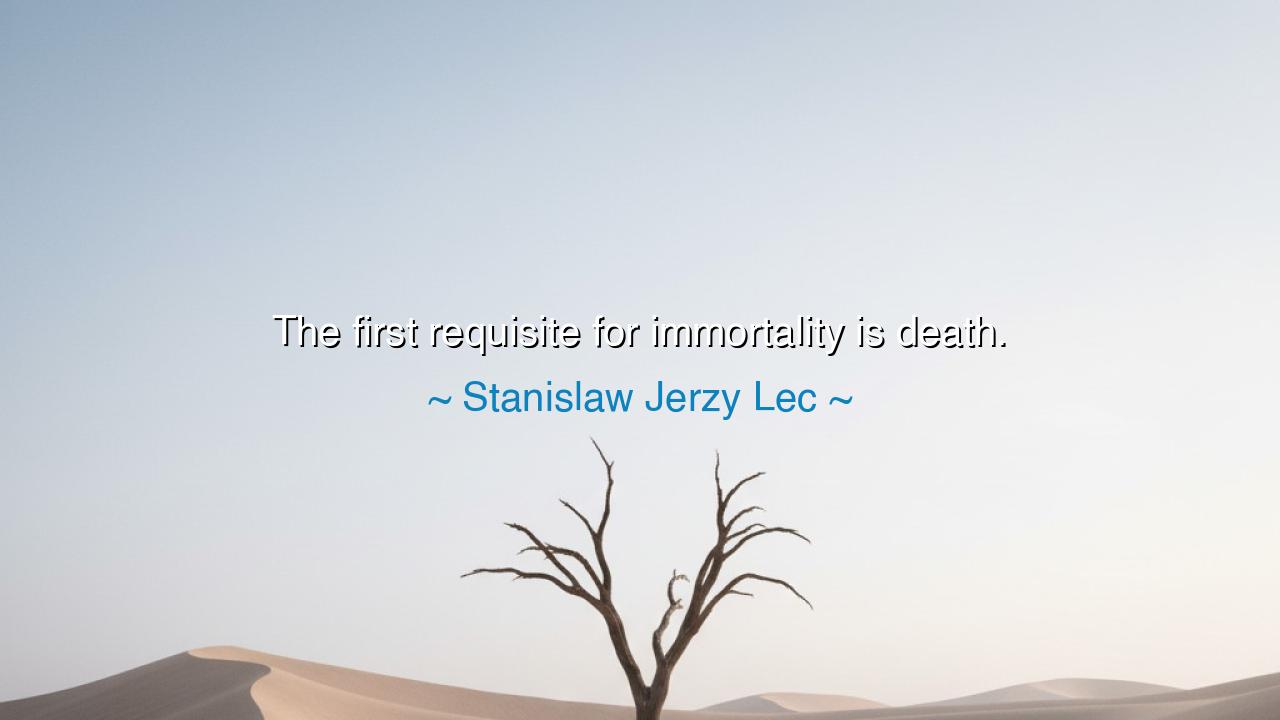
The first requisite for immortality is death.






In the haunting words of Stanisław Jerzy Lec, poet, philosopher, and survivor of the great darkness of the twentieth century, there burns a paradox that every soul must one day face: “The first requisite for immortality is death.” These words, sharp as iron yet luminous as truth, remind us that all who seek eternity must first surrender to mortality. Lec, who had seen both the horror of war and the fragility of human life, spoke not as a man of abstraction, but as one who had looked into the abyss and learned that only through the acceptance of death can one transcend it.
To understand this saying, one must first understand the law of transformation that governs all creation. The seed must die in the soil before the tree can rise toward the light. The caterpillar must surrender its form within the cocoon before it can take wing as a butterfly. Likewise, man — in spirit and in purpose — must pass through the gate of death, literal or symbolic, to reach immortality. Whether this immortality be of the soul, of the legacy, or of the art that endures beyond the flesh, it demands the sacrifice of the self that clings to the temporal. To wish for eternal life without accepting death is to dream of harvest without planting, of dawn without night.
In Lec’s own time, death was no distant idea — it was a shadow that walked beside him. Born in Poland, he lived through occupation, imprisonment, and atrocity. He witnessed the destruction of his homeland and the silence of countless voices. Yet from the ruins, he wrote with a strange serenity, as though he had discovered a secret hidden within despair: that even the ruins could speak; that life reborn from death carries a wisdom that the untouched can never know. Thus his words are not morbid, but transformative — a testimony that what dies in the flesh or the moment may yet live in spirit and eternity.
Throughout history, we have seen this truth made manifest in the lives of those who have given themselves to something greater than survival. Consider the story of Socrates, who, when sentenced to death, drank the poison without fear. He said that death was not an end but a passage — a journey to a higher form of understanding. His body perished, but his philosophy, his courage, and his name became immortal. In giving up his life for truth, he fulfilled Lec’s axiom: to live forever, one must first be willing to die. The same fire burned in Christ, who embraced death to conquer it, proving that love and spirit endure where flesh and empire fail.
Yet Lec’s wisdom is not bound to the realm of physical death alone. It speaks, too, of the deaths within life — the moments when we must allow parts of ourselves to perish so that something purer may be born. The death of pride that gives way to humility, the death of hatred that allows forgiveness to bloom, the death of comfort that births courage. Every rebirth requires a letting go. The person who clings too tightly to what is transient — wealth, fame, ego, or fear — imprisons himself within mortality. Only by dying to these illusions can the spirit touch the infinite.
There is a hidden mercy in this teaching: death, in whatever form it takes, is not the end of being, but the threshold of transformation. Those who accept this truth walk with peace through the storms of life. They do not tremble when the old falls away, for they know that decay is the mother of creation. As the ancients said, “The phoenix must burn before it can rise.” So too must man pass through death — of body, of self, or of ignorance — to claim his share of eternity.
Therefore, my children of the present and the future, take this lesson to heart: do not fear death, but understand it. For it is not the enemy of life, but its companion and completion. Let each ending be embraced with reverence, for within every ending lies the seed of what is eternal. If you would leave a mark upon the world, if you would live beyond your own span of years, then give yourself fully — even unto death — to truth, to love, to creation. For as Stanisław Jerzy Lec wrote with the wisdom of one who had endured the fire, the first step toward immortality is to die — not in despair, but in the faith that something greater will rise from the ashes.






AAdministratorAdministrator
Welcome, honored guests. Please leave a comment, we will respond soon